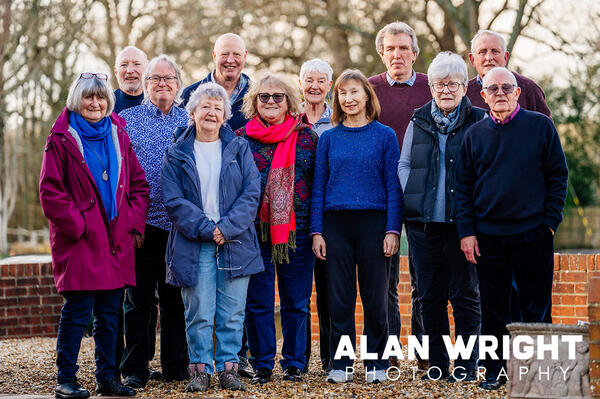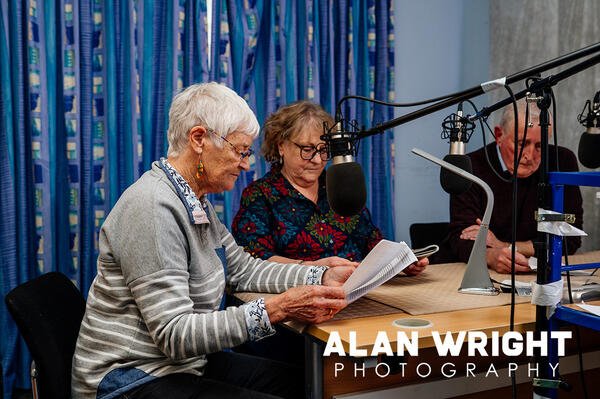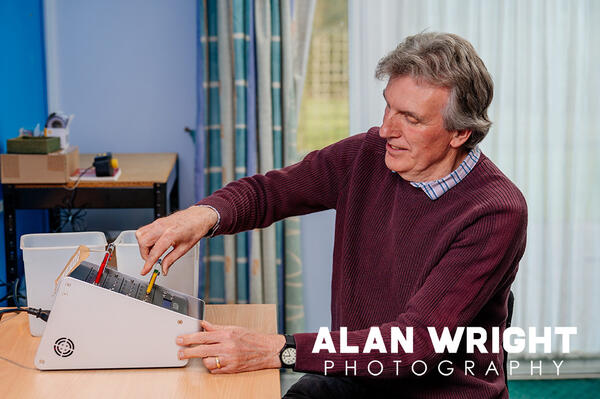THE ROUNDABOUT TALKING NEWS

Published on 1st April 2025
Roundabout Talking News is a volunteer-run charity that has provided free weekly news to the blind and visually impaired since 1978. A team of about 40 volunteers run the service, meeting once a week to provide listeners with local news and interesting features, as well as obituaries and entertainment listings. AAH met some of the volunteers to find out more…
Toni Spence-Holey (Reader): I am one of the longest-serving volunteers at RTN. I joined the team while still teaching at St Leonard’s School in Horsham, having heard about the service from a colleague. I didn’t know anyone who was blind or visually impaired, but always thought that it must be very hard to live with and wanted to help in a small way. In those days, we met at Collyer’s and RTN was run by Enid Darby, who was terribly strict. We had to come in half an hour before every recording session to rehearse. I’m pleased to say that it’s more relaxed now!
Ian Macklearn (Magazine): There are several different teams involved in the production process on Thursday evenings. The News Editing and Magazine teams begin at 4.30pm, selecting and editing articles for the Readers to record a couple of hours later. So, some of us rarely see each other! We used to meet at the Drill Hall, but as the venue is being renovated before it’s taken over by Lifespring Church, we are currently based at Orchard Lodge in Warnham, a former care home.
Mark Kelly (News): There are about 10 volunteers in the Editing team, with four of us here on any given week. The West Sussex County Times is our local news source and the job of the Editors is to pick articles that our readers might want to know about and cut them down to 250 words or less. We try to be apolitical, so if an article expresses the political opinion of an MP or Councillor, we wouldn’t use it. However, we do like to include details of events such as fêtes and flower shows, as well as topical news, like the debate on Council devolution.
Carol Dilley (Chair): Most of the articles we choose have a positive slant, so it’s not all about housing development on greenfield sites or rising car parking fees. We try to include health news too. A recent example included a change to the way people book blood tests, which is the kind of important information that listeners appreciate.
Mark: To maintain a positive feel, we tend not to include much crime news. We would include headline news, but wouldn’t read out a long list of robberies or court reports, as it needlessly worries people. We cover sports too when there’s local interest. So, when Horsham FC enjoyed a run in the FA Cup last season, we kept listeners up to date.

Carol: The County Times has always been a good paper, but in recent years hasn’t had quite the same local focus, as its reporters cover a wider area for the newspaper group’s Sussex World website. While our relationship remains strong, we are considering other sources of local news to give listeners access to information from other publications and websites too.
Ian: The remit of the Magazine team is broader than that of the News team. We select articles from a wider range of sources. I tend to look out for things with elements of humour, such as lists of songs that make people feel happy. Occasionally, we offer something different. I was a student in Cardiff at the time of the Aberfan disaster in 1966 and remember the profound effect it had on me and other students. I recounted my memories for the Magazine and it generated lots of good feedback.
Carol: We rarely have a problem finding enough articles for the Magazine section. Volunteers can contribute anything for consideration, as long as it’s not religious or political. Recently, we’ve featured articles about wetlands projects on the South Downs, Ladybird Books and rhubarb recipes. We also include a synopsis of new films, such as Mickey 17 and Bridget Jones: Mad About The Boy.
Toni: We usually have a team of three people who read the news in the studio. It isn’t an easy thing to do. My husband, who is on the Editing team, auditioned but was rejected as his pronunciation of some words wasn’t clear enough. You need to be precise and maintain consistent pacing. Your diction should be clear, but not too posh. I sometimes critique newsreaders on TV, especially when they use poor grammar, as it’s important to maintain standards. I find that smiling sets the right tone and listeners respond positively to that. I personally think it’s okay to express yourself too, so if I’m reading a funny story, a chuckle creates the sense of a shared experience.
Andy Rafferty (Sound Technician): I was reading the County Times some years ago when I saw a letter from someone who used to volunteer at RTN, appealing for sound technicians. As an IT specialist, working with IBM mainframes before retiring, I felt I could help and learn about sound engineering at the same time. We have three on the sound team and the rota requires us to volunteer once every three weeks. We record the News every week at 7pm but the Magazine is recorded on alternate weeks, with two weeks’ worth covered at a time. The most important aspect of my role is to record at consistent levels. When the Readers enter the studio, they talk into a microphone so I can balance the sound. During recording, I note the time stamp of any mistakes, coughs or interruptions, so I can correct them in post-production.

Barry Clinton (Copying): I organise four teams of copiers, with two people fulfilling the role each week. The Sound Technician makes a master copy of the recordings and our job is to make copies on memory sticks. These are placed in yellow padded wallets by our Preparation team and posted to subscribers. While one person in the Copying team makes copies, the other organises the record cards, which include the names and addresses of RTN subscribers. One of our biggest problems is when listeners – or their carers – fail to return memory sticks on time!
David Gubb (Copying): The County Times is published every Wednesday, although it isn’t on the shelves until Thursday morning. One of the Editing team will buy the paper and source relevant articles for the readers to record that same evening. On Friday morning, the Copying team come in and the memory sticks are packed into wallets and posted by the Preparation team before lunch. So, the turnaround is very fast.
Andy: We used to record on cassette tapes, which was difficult, as we had to stick rigidly to 30 minutes for News and the same for the Magazine on the other side. We have more flexibility now, so if it ticks over by a few minutes, it’s not the end of the world!
Carol: It is hard to know how many listeners we have. The number of memory sticks distributed has gone down to about 60 a week, but there are other ways of listening. The recordings are uploaded to our website and many listen online. It could be that we have listeners overseas, who have moved away but maintain an interest in the Horsham District. However, there are still people living locally who don’t know about us, yet would benefit from the service.
Ian: I have volunteered here for about 10 years, joining after reading a feature in AAH. Having moved from London, RTN helped me make connections locally and I find it very enjoyable. It is something I would recommend people get involved with if they’re looking for something to do in their spare time.
Toni: I am 90 this year and can’t do everything I used to, but I still enjoy reading the news. I recently heard that a long-time listener of RTN, May Piggott, had passed away. Her daughter sent me a message on Facebook saying that May always liked it when I was reading the news, and it’s lovely to receive that kind of feedback. It’s a reminder that we do make a difference.
WORDS: Ben Morris / PHOTOS: Alan Wright
FURTHER INFORMATION: To find out more about Roundabout Talking News, including how to subscribe or listen online, visit www.horsham.mytn.uk


